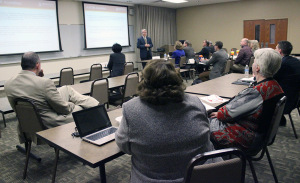
Senior administrators, college deans and other staff members watched about 30 presentations over two days beginning the budget process that will culminate in August with a presentation to the Board of Regents.
The President’s Cabinet invited university departments to present their budgets to the Budget Oversight Committee so administrators can better learn the departments’ needs.
“[We want to hear] what the needs are, and hear it from the directors themselves, like what challenges they’re facing and what we can do to help,” said Valarie Maxwell, director of budget and management.
The biannual meetings were held in the Dillard College of Business Administration building Jan. 26 and 27. Staff and non-academic departments such as facilities, the wellness center and the police department presented on Monday while each of the six college deans and the dean of the graduate school presented their budget proposals Tuesday.
Maxwell said she and other members of the budget committee look for “common threads” to maximize the budget’s potential.
“We did this two years ago and there was a common thread of technology needs and, quite honestly, salaries. So we thought, ‘If there’s a common thread, what can we do for the whole university that’s going to benefit.’ That’s when we put extra money into the classroom technology and into the Wi-fi to get that set up,” Maxwell said. “If we can do something that helps and impacts wider people, we get more bang for the buck. So we’re just trying to make sure we’re efficient with the dollars.”
Maxwell said the presenters will then submit a formal budget after the meetings for the committee to consider and look for ways to fund common areas, and according to University President Jesse Rogers, none of the departments will see cuts—they just may not get everything their representative asked for.
“We’re not going to be in the position where we have to cut off funding. That’s awful,” said Rogers. “However, as I said, the frustrating thing about this is that I didn’t hear anyone today ask for anything that could not be justified.”
But as Marilyn Fowlé, vice president of business affairs and finance, said after Tuesday’s presentations, “We don’t have the money for all of this.”
“We’ll just have to generally set priorities in the budgeting process, and one of the top places would be when somebody can say, ‘I can let 60 more students in if I had one more faculty member.’ There’s some risk in that, but you always have to take some risk,” Rogers said. “It’s just like investing in the business world. If you get too risk averse, you don’t make any money.”
After looking for ways to raise income, Rogers said the committee will then look to make sure there are enough core classes to meet the needs of the student body.
“The next thing we look for, are we putting enough basic courses in to serve the majors that we’re bringing in,” Rogers said.
For James Johnston, dean of the Gunn College of Health Sciences and Human Services, an increased amount of core classes is vital to allowing his at-capacity college to grow.
“It creates problems for us. Our students are frustrated because they need the courses to be competitive to get in,” Johnston said. “In terms of the university, the greater need is to balance the ability to accommodate all of our students. Humanities and social sciences, science and math, and fine arts have that dual role of providing the core. I think our growth outpaced the rest of those, so university-wide it needs to be balanced.”
Johnston said he and other faculty in the college resort to advising students to take some of their core classes at Vernon College, effectively taking money away from the university.
“When we’re having to advise students elsewhere, for us it’s the ability to find the core courses that they need, so we send them where they elect to go because they want to be competitive sooner rather than later,” Johnston said. “So now our own transfers, our own completion degrees, are at capacity. Radiology is one of those examples that we can’t take any more transfers. We have to have more faculty, we have to have more course offerings, we have to have more physical space or it just can’t happen.”
In addition to needing more core classes to meet the needs of his growing college, Johnston said the future of the college also hinges on the legislature approving enough funds to construct a new health science building.
“If you want my college, the college of health sciences, to continue to grow and move forward, we’re going to need the faculty space and the building,” Johnston said. “We want to increase our enrollment and grow the university, but we’ve just got to find the resources financially to give us the balance we need so we can grow as a university.”














